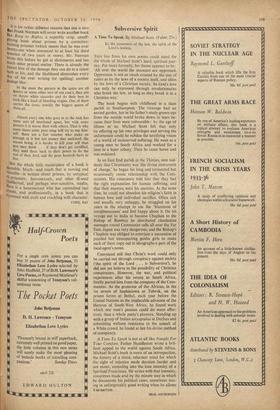Subversive Spirit
A Time To Speak. By Michael Scott. (Faber, 21s.) To the possessors of the law, the spirit of the Lord is lawless.
THIS line from his own poems could stand for the whole of Michael Scott's hard, spiritual jour- ney. Put more formally, his theme appears to be : 'All over the world the innocent are oppressed. Oppression is not so much created by the sins of rulers as by the laws of a society itself, and often by the laws of a Christian society. So God's love can only be expressed through revolutionaries who break the law, so long as they break it in a Christian way.'
The book begins with childhood in a slum parish in Southampton. The vicarage had an envied garden, but in his father's study grown-ups from the outside world broke down in tears be- cause their lives were unbearable : by the age of fifteen or so, Michael Scott felt that only by offering up his own privileges and serving the unfortunate could he subdue the terrifying vision of a world of undeserved suffering. He went as a young man to South Africa and worked for a time in a leper colony. Then he came home and was ordained.
In an East End parish in the Thirties, sure sud- denly that Christianity was 'the divine instrument of change,' he began his long and tormented but occasionally comic relationship with the Com- munists. His conscience told him that they had the right explanation for human suffering, and that their enemies were his enemies. At the same time, he could not abandon his religion's faith in human love and individual sacrifice. Often sick and usually very unhappy, he struggled on for years in the attempt to use the 'Mammon of unrighteousness' and feel happy about it. On his voyage out to India to become Chaplain to the Bishop of Bombay he distributed clandestine messages round Communist cells all over the Far East. Japan was very dangerous, and the Bishop's Chaplain was obliged to entertain a succession of puzzled but unsuspecting geisha girls to make each of them copy out in ideographs a part of the local agent's name.
Convinced still that Christ's work could only be carried out through conspiracy against society ('the spirit of the Lord . . . is Subversive'), he did not yet believe in the possibility of Christian conspirators. However, the war, and political experiences after his return to South Africa, finally parted him from the company of the Com- munists. As the protector of the African, in the tin streets of Sophiatown or Tobruk, on the prison farms at Bethel, each year before the United Nations as the implacable advocate of the Hereros of South-West Africa, he found work which one man's passion could do more effec- tively than a whole party's pressure. Standing up with a group of Indian satyagrahas at Durban and submitting without resistance to the assault of a White crowd, he found at last his divine method of conspiracy.
A Time To Speak is not at all like Naught For Your Comfort. Father Huddleston wrote a bril- liant appeal to the world against South Africa. Michael Scott's book is more of an introspection, the history of a timid, reluctant mind for which the sight of injustice made decision harder and not easier, annealing into the lean intensity of a Spiritual Franciscan. He writes with that intensity, sometimes made arid by the minute way in which he documents his political cases, sometimes issu- ing in unforgettably good writing when he allows it to narrate.
NEAL ASCHERSON


































 Previous page
Previous page